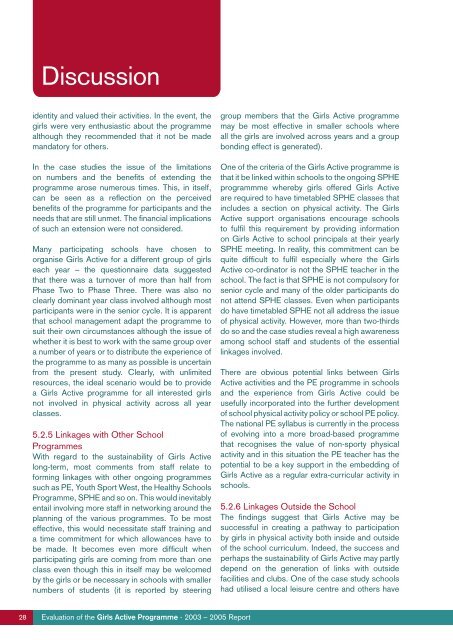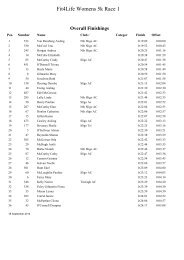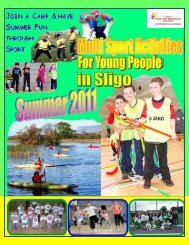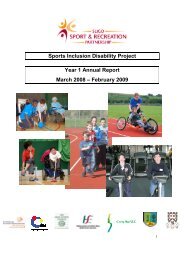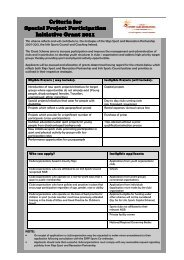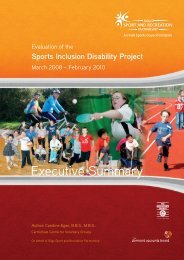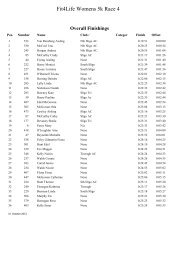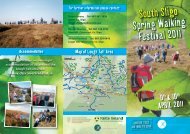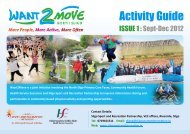Girls Active Programme - Sligo Sport and Recreation Partnership
Girls Active Programme - Sligo Sport and Recreation Partnership
Girls Active Programme - Sligo Sport and Recreation Partnership
You also want an ePaper? Increase the reach of your titles
YUMPU automatically turns print PDFs into web optimized ePapers that Google loves.
Discussion<br />
identity <strong>and</strong> valued their activities. In the event, the<br />
girls were very enthusiastic about the programme<br />
although they recommended that it not be made<br />
m<strong>and</strong>atory for others.<br />
In the case studies the issue of the limitations<br />
on numbers <strong>and</strong> the benefits of extending the<br />
programme arose numerous times. This, in itself,<br />
can be seen as a reflection on the perceived<br />
benefits of the programme for participants <strong>and</strong> the<br />
needs that are still unmet. The financial implications<br />
of such an extension were not considered.<br />
Many participating schools have chosen to<br />
organise <strong>Girls</strong> <strong>Active</strong> for a different group of girls<br />
each year – the questionnaire data suggested<br />
that there was a turnover of more than half from<br />
Phase Two to Phase Three. There was also no<br />
clearly dominant year class involved although most<br />
participants were in the senior cycle. It is apparent<br />
that school management adapt the programme to<br />
suit their own circumstances although the issue of<br />
whether it is best to work with the same group over<br />
a number of years or to distribute the experience of<br />
the programme to as many as possible is uncertain<br />
from the present study. Clearly, with unlimited<br />
resources, the ideal scenario would be to provide<br />
a <strong>Girls</strong> <strong>Active</strong> programme for all interested girls<br />
not involved in physical activity across all year<br />
classes.<br />
5.2.5 Linkages with Other School<br />
<strong>Programme</strong>s<br />
With regard to the sustainability of <strong>Girls</strong> <strong>Active</strong><br />
long-term, most comments from staff relate to<br />
forming linkages with other ongoing programmes<br />
such as PE, Youth <strong>Sport</strong> West, the Healthy Schools<br />
<strong>Programme</strong>, SPHE <strong>and</strong> so on. This would inevitably<br />
entail involving more staff in networking around the<br />
planning of the various programmes. To be most<br />
effective, this would necessitate staff training <strong>and</strong><br />
a time commitment for which allowances have to<br />
be made. It becomes even more difficult when<br />
participating girls are coming from more than one<br />
class even though this in itself may be welcomed<br />
by the girls or be necessary in schools with smaller<br />
numbers of students (it is reported by steering<br />
group members that the <strong>Girls</strong> <strong>Active</strong> programme<br />
may be most effective in smaller schools where<br />
all the girls are involved across years <strong>and</strong> a group<br />
bonding effect is generated).<br />
One of the criteria of the <strong>Girls</strong> <strong>Active</strong> programme is<br />
that it be linked within schools to the ongoing SPHE<br />
programmme whereby girls offered <strong>Girls</strong> <strong>Active</strong><br />
are required to have timetabled SPHE classes that<br />
includes a section on physical activity. The <strong>Girls</strong><br />
<strong>Active</strong> support organisations encourage schools<br />
to fulfil this requirement by providing information<br />
on <strong>Girls</strong> <strong>Active</strong> to school principals at their yearly<br />
SPHE meeting. In reality, this commitment can be<br />
quite difficult to fulfil especially where the <strong>Girls</strong><br />
<strong>Active</strong> co-ordinator is not the SPHE teacher in the<br />
school. The fact is that SPHE is not compulsory for<br />
senior cycle <strong>and</strong> many of the older participants do<br />
not attend SPHE classes. Even when participants<br />
do have timetabled SPHE not all address the issue<br />
of physical activity. However, more than two-thirds<br />
do so <strong>and</strong> the case studies reveal a high awareness<br />
among school staff <strong>and</strong> students of the essential<br />
linkages involved.<br />
There are obvious potential links between <strong>Girls</strong><br />
<strong>Active</strong> activities <strong>and</strong> the PE programme in schools<br />
<strong>and</strong> the experience from <strong>Girls</strong> <strong>Active</strong> could be<br />
usefully incorporated into the further development<br />
of school physical activity policy or school PE policy.<br />
The national PE syllabus is currently in the process<br />
of evolving into a more broad-based programme<br />
that recognises the value of non-sporty physical<br />
activity <strong>and</strong> in this situation the PE teacher has the<br />
potential to be a key support in the embedding of<br />
<strong>Girls</strong> <strong>Active</strong> as a regular extra-curricular activity in<br />
schools.<br />
5.2.6 Linkages Outside the School<br />
The findings suggest that <strong>Girls</strong> <strong>Active</strong> may be<br />
successful in creating a pathway to participation<br />
by girls in physical activity both inside <strong>and</strong> outside<br />
of the school curriculum. Indeed, the success <strong>and</strong><br />
perhaps the sustainability of <strong>Girls</strong> <strong>Active</strong> may partly<br />
depend on the generation of links with outside<br />
facilities <strong>and</strong> clubs. One of the case study schools<br />
had utilised a local leisure centre <strong>and</strong> others have<br />
28<br />
Evaluation of the <strong>Girls</strong> <strong>Active</strong> <strong>Programme</strong> - 2003 – 2005 Report


